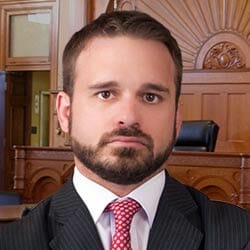November 3rd, 2015 by Attorney Dan Carman

People tie the knot for lots of reasons — maybe because of tradition, finding their soul mate, wanting to have kids, or even out of fear of staying single. Regardless of the motivation behind it, federal law grants approximately 1,138 benefits, rights, and protections to married couples. They touch upon nearly every area of life, from debts to medical care, taxes to insurance. Based on the policy of encouraging harmonious relations, spouses may also be able to claim two separate privileges that protect them from testifying against each other at trial. Known collectively as the spousal privilege, one is called the “testimonial privilege” while the other is referred to as the “communications privilege.”
While both privileges can be applied in criminal cases, their scope varies based on whether the case is in federal or state court. In Kentucky, the testimonial privilege gives the “witness spouse” the right to refuse to testify against the “party spouse,” and the party spouse has the right to prevent the witness spouse from testifying against him or her. The privilege covers events that occur after the date of the marriage. The communications privilege is also held by both spouses, so either may invoke it to prevent the other from testifying about a confidential communication made during marriage.
While the ability to communicate freely with your spouse is important, the privilege does not apply to bar evidence from all court proceedings. Common exceptions include:
- When charged for a crime against your spouse or spouse’s property
- When charged for a crime against the child of either spouse
- When asked about matters that happened prior to the marriage
- If either spouse discloses confidential information to a third party, the privilege will not bar the third person from testifying.
If you are not legally married, there is no privilege, regardless of how long you have been a couple. Back in 2013, the same-sex wife of a woman charged with murder was ordered to testify against her at the trial because same-sex partners were not protected by the husband-wife privilege under Kentucky’s state law. With the ruling in June in Obergefell v. Hodges that all 50 states must recognize same-sex marriages, the spousal privilege likely now includes the confidential communications of legally married same-sex couples in federal proceedings.
If you have been accused of a crime and your spouse is being asked to testify against you, or if you have questions about your legal marital communications rights, discuss it with one of the attorneys at the Lexington, KY-based Carman Law Firm. As criminal defense attorneys with years of experience, we offer thorough, experienced representation. Call today at (859) 685-1055 or fill out this online contact form to find out how we can help you.

 Focusing on criminal matters, Mr. Carman is admitted to practice law in all Courts of the Commonwealth of Kentucky, the United States District Courts for the Eastern and Western Districts of Kentucky, and the United States Court of Appeals, Sixth Circuit. He is a member of the American, Kentucky, and Fayette County Bar Associations. Mr. Carman also worked as a prosecutor, as well as a legal assistance attorney. Attorney Dan Carman can help you with any criminal defense matters you may need including; DUI, drug, and weapons charges, trespassing, traffic violations and more. [
Focusing on criminal matters, Mr. Carman is admitted to practice law in all Courts of the Commonwealth of Kentucky, the United States District Courts for the Eastern and Western Districts of Kentucky, and the United States Court of Appeals, Sixth Circuit. He is a member of the American, Kentucky, and Fayette County Bar Associations. Mr. Carman also worked as a prosecutor, as well as a legal assistance attorney. Attorney Dan Carman can help you with any criminal defense matters you may need including; DUI, drug, and weapons charges, trespassing, traffic violations and more. [